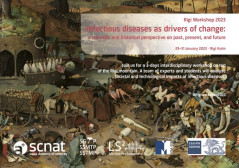Workshop
PhD and Post-docs: Are you interested in biology, history, epidemics or medicine ? Join us for a 3-days workshop at Mount Rigi-Kulm from 29th to 31st of January 2023. During the workshop, you will explore past and present epidemic/pandemic events and their technical and societal impacts, beyond the dramatic loss of lives.
nfectious diseases (IDs) have shaped societies throughout the history of humanity. Their impact goes beyond the immediate loss of lives and livelihoods, to include major shifts in economy, demographics, labor policy, and social construction. The bubonic plague that swept through Europe several times from the 14th century, or the IDs brought by European colonizers that decimated the First Nations in the Americas (16-17th centuries) are two examples of many such events. Their destructive nature is often followed by profound changes, leading to innovations in science, technology and society, which may not have been possible without an ID-driven shock, thus illustrating the duality of epidemics and pandemics.
The Rigi workshop planned for January 2023 aims to invite participants with various backgrounds on an interdisciplinary journey to explore the significance of IDs as drivers of change. Our knowledge of the past and present of IDs will be projected onto future scenarios where questions concerning biomedical ethics, loss of biodiversity and natural habitats, human contact limitation and the push towards more digital life experiences, will be critically discussed. The workshop offers an interdisciplinary reflection on the pandemic experience that brings us all together and opportunities for a synergistic approach to investigating and analyzing societal and technological impacts of IDs.
The workshop features keynote lectures delivered by leading experts in the field, case studies in teams, and sharing of group and individual work in the form of poster and oral presentations.
Speakers
Prof. Dr. Daniel Bausch, FIND Geneva
Outbreak Response: From Colonialism to the Emerging Global Architecture
Prof. Dr. Flurin Condrau, University of Zürich
Why History of Medicine ?
Dr. Leander Diener, Univerity of Zurich
How to see the big picture: the role of medical history during a pandemic
Prof. Dr. Johannes Krause, Max Planck Institute for Evolutionary Anthropology, Leipzig
The genetic history of the plague and the origin of the Black Death
Prof. Dr. Verena Schünemann, University of Zurich and University of Vienna
Ancient DNA and pathogens: tracing disease through time
PD Dr. Kaspar Staub, University of Zurich
Connecting the past and present of infectious diseases: An interdisciplinary and quantitative approach via epidemiology, health history and digital humanities
Dr. Danelle van Zyl-Hermann, University of Basel
Global Health in historical perspective
Dr. Frédéric Vagneron, University of Strasbourg
Research topic: History of medicine and health, of the relation of human health and animal health
Prof. Dr. Jing Wang, ETH Zurich
Understanding airborne transmission of SARS-CoV-2
Who can apply?
PhD students and Postdocs from all Swiss institutions of higher education. Please contact your doctoral school for the accreditation of ECTS which we estimate at 2 ECTS. Masters students applications are also considered.
Registration
Please register online and submit your abstract of research and a short letter of motivation by 30 September 2022. The organizing committee will select up to 30 outstanding applicants.
Organizzato da
Prof. Dr. Carmen Faso, SSTMP, University of Bern, Dr. Lucienne Tritten, SSTMP, Swiss Tropical and Public Health Institute, Prof. Dr. Hubert Steinke, SSHMN, University of Bern, Prof. Dr. Flurin Condrau, SSHMN, University of Zurich, Prof. Dr. Pilar Junier,
Ulteriori informazioni sugli eventi
Informazioni sui costi
CHF 150.00
The registration fee is CHF 150.– and includes housing and meals.
